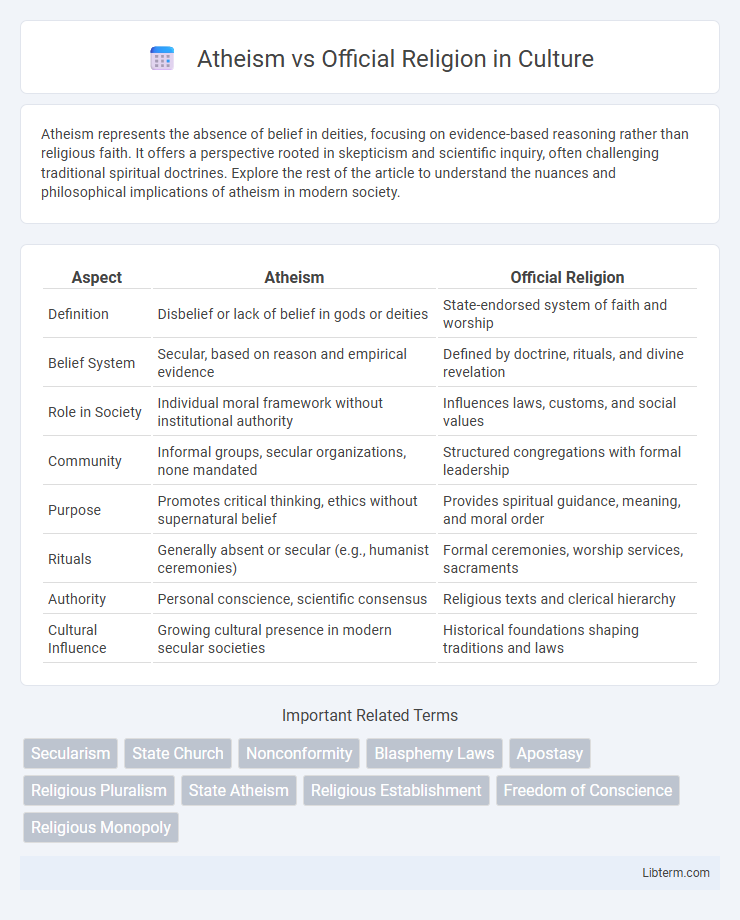Atheism represents the absence of belief in deities, focusing on evidence-based reasoning rather than religious faith. It offers a perspective rooted in skepticism and scientific inquiry, often challenging traditional spiritual doctrines. Explore the rest of the article to understand the nuances and philosophical implications of atheism in modern society.
Table of Comparison
| Aspect | Atheism | Official Religion |
|---|---|---|
| Definition | Disbelief or lack of belief in gods or deities | State-endorsed system of faith and worship |
| Belief System | Secular, based on reason and empirical evidence | Defined by doctrine, rituals, and divine revelation |
| Role in Society | Individual moral framework without institutional authority | Influences laws, customs, and social values |
| Community | Informal groups, secular organizations, none mandated | Structured congregations with formal leadership |
| Purpose | Promotes critical thinking, ethics without supernatural belief | Provides spiritual guidance, meaning, and moral order |
| Rituals | Generally absent or secular (e.g., humanist ceremonies) | Formal ceremonies, worship services, sacraments |
| Authority | Personal conscience, scientific consensus | Religious texts and clerical hierarchy |
| Cultural Influence | Growing cultural presence in modern secular societies | Historical foundations shaping traditions and laws |
Understanding Atheism: Definitions and Core Beliefs
Atheism is defined by the absence of belief in deities, distinguishing it from official religions that typically center on worship and faith in supernatural beings. Core beliefs of atheism emphasize reliance on empirical evidence, critical thinking, and secular ethics rather than divine revelation or dogma. Understanding atheism requires recognizing its foundation in skepticism and naturalism, which prioritizes human reason and scientific inquiry over religious doctrine.
Official Religion: Meaning and Global Examples
Official religion refers to a faith or belief system endorsed and supported by a government as the state religion, often influencing legal frameworks and cultural practices. Examples include Islam as the official religion of Saudi Arabia, Anglican Christianity in England, and Buddhism in Thailand. These state religions shape national identity and social policies, reflecting the interplay between religion and governance worldwide.
Historical Roots of Atheism and Organized Religion
The historical roots of atheism trace back to ancient philosophers like Democritus and Epicurus, who challenged the existence of gods through early naturalistic explanations. Organized religion, exemplified by institutions such as the Catholic Church and Eastern Orthodox Church, arose with codified doctrines and rituals that shaped societal structures over millennia. The tension between atheism and official religion reflects competing worldviews on supernatural belief, moral authority, and the role of faith in governance.
Comparative Analysis: Worldview and Ethics
Atheism emphasizes a secular worldview based on empirical evidence and rational inquiry, rejecting supernatural beliefs inherent in official religions. Ethical frameworks in atheism often stem from humanistic principles that prioritize individual well-being and societal progress, contrasting with religion-driven ethics grounded in divine commandments and traditional doctrines. This comparative analysis highlights divergent foundations in understanding existence and morality, influencing cultural norms and personal values globally.
Social and Cultural Impacts of Belief Systems
Atheism challenges traditional social structures often upheld by official religions, influencing shifts in cultural norms and promoting secularism in public life. Official religions typically foster community cohesion and shared moral frameworks, which can enhance social stability yet also result in exclusion or marginalization of non-adherents. The tension between atheistic and religious worldviews shapes policies on education, human rights, and cultural expression, reflecting broader societal debates on pluralism and identity.
Atheism and Official Religion in State Policy
Atheism in state policy emphasizes secular governance and the separation of religion from government affairs to ensure neutrality and equal rights for all citizens. Official religion in state policy often entails state endorsement or preference for a particular faith, influencing legislation, education, and public life in alignment with religious doctrines. The balance between atheism and official religion in state policy significantly impacts civil liberties, religious freedom, and social cohesion within a country.
Education, Science, and Religious Influence
Atheism often promotes a secular approach to education, emphasizing critical thinking and scientific inquiry over religious doctrine, which contrasts with official religions that integrate faith-based teachings into curricula. Scientific advancement thrives in environments where empirical evidence and skepticism are prioritized, while religious influence can both support moral education and limit certain scientific perspectives, such as evolution or cosmology. Educational policies reflecting atheistic principles typically advocate for separation of church and state, fostering inclusive learning spaces free from doctrinal bias and reinforcing empirical knowledge.
Debates on Morality: Secular vs Religious Perspectives
Debates on morality between atheism and official religion often center on the source of ethical values, where secular perspectives emphasize reason, empathy, and social consensus as foundations for moral behavior. Religious viewpoints typically ground morality in divine commandments and spiritual teachings, asserting that objective moral truths stem from a deity. The contrast highlights ongoing discussions about whether moral frameworks require supernatural authority or can be effectively derived from humanistic and empirical principles.
Tolerance, Coexistence, and Interfaith Dialogue
Atheism and official religion often hold contrasting worldviews, yet fostering tolerance and coexistence between both communities is essential for social harmony. Promoting respectful interfaith dialogue encourages mutual understanding, reduces prejudice, and enables collaborative efforts in addressing societal challenges. Emphasizing common values such as human rights and ethical living supports peaceful coexistence despite differing beliefs.
Future Trends: The Evolving Landscape of Belief
The evolving landscape of belief indicates a significant rise in atheism as younger, more secular generations prioritize science and individualism over traditional doctrines. Surveys from Pew Research Center project a decline in official religious affiliation worldwide, with many societies experiencing increased religious disaffiliation and skepticism. Technological advancements and global connectivity further accelerate exposure to diverse worldviews, fostering a more pluralistic and individualized approach to spirituality and belief systems.
Atheism Infographic

 libterm.com
libterm.com